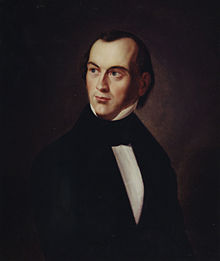Karl Otfried Müller
Karl Otfried Müller | |
|---|---|
 Portrait of Karl Otfried Müller by Wilhelm Ternite (1838) | |
| Born | 28 August 1797 Brieg, Silesia, Kingdom of Prussia |
| Died | 1 August 1840 (aged 42) |
| Relatives |
|
| Academic background | |
Gottfried Hermann | |
Karl Otfried Müller (
Biography
He was born at Brieg (modern
Turning away from the Enlightenment conception of Greek myth as a reflection of a universal religion in its infancy, Müller placed the study squarely as the outcome of an encounter between the particular character of a people and a specific historical setting,[4] where, in the broadest sense it has remained, though his convictions that the core of each culture is uniquely its own led him to deny the influence of Egyptian art on Greek art,[5] already being recognised at the time.

Müller's position at Göttingen was made difficult by the political troubles which followed the accession of
Works

His aim was to form a vivid conception of Greek life as a whole.
His Prolegomena zu einer wissenschaftlichen Mythologie (1825), in which he avoided the views of
The study of ancient art was promoted by his Handbuch der Archäologie der Kunst (1830; 3d ed. by Welcker, 1848; English trans. by J. Leitch, London, 1847) and Denkmäler der alten Kunst (1832), which he wrote in association with Carl Oesterley. In the former work, he coined the term "pornographie" (pornography) in German, which helped to popularize the term internationally.[8] The latter work was continued and completed by Friedrich Wieseler (1846–56).
In the last years of his life, he undertook to prepare for the English Society for the Diffusion of Useful Knowledge, a history of Greek literature, which in 1841 appeared posthumously as Geschichte der griechischen Litteratur bis auf das Zeitalter Alexanders (4th ed., revised and continued by Heitz, 1882–84). It was translated into English from the author's manuscript as History of the Literature of Ancient Greece and published the previous year in London. Chapters i.-xxii. were translated by Sir George Cornewall Lewis; chapters xxiii.-xxxvi. by J. W. Donaldson, who carried the work down to the taking of Constantinople by the Turks. It remained one of the best books on the subject for many years.[3]
Müller also published an admirable translation of the Eumenides of
Quotes
Family
His brothers were Julius Müller (1801–1878), a theologian, and Eduard Müller (1804–1875), a philologist.
Notes
- Encyclopedia Britannica. Retrieved 2023-01-15.
- ^ a b Baynes, T. S.; Smith, W. R., eds. (1884). . Encyclopædia Britannica. Vol. 17 (9th ed.). New York: Charles Scribner's Sons.
- ^ a b c d e Chisholm 1911.
- ^ Josine H. Blok, "Quests for a Scientific Mythology: F. Creuzer and K. O. Muller on History and Myth," History and Theory 33.4, "Proof and Persuasion in History" (December 1994:26-52)
- ^ In his article "On the alleged Egyptian origin of Greek art" ("Ueber den angeblich ägyptischen Ursprung der griechischen Kunst,") Kunstblatt: Beiblatt der Morgenblatt 79 (1820), reprinted in Kleine deutsche Schriften.
- ^ Baedeker, Karl (1896). Athens. Baedeker. p. 74. Retrieved 14 January 2016.
{{cite book}}:|work=ignored (help) - ^ http://hdl.handle.net/10900/100742 S. Krmnicek und M. Gaidys, Gelehrtenbilder. Altertumswissenschaftler auf Medaillen des 19. Jahrhunderts. Begleitband zur online-Ausstellung im Digitalen Münzkabinett des Instituts für Klassische Archäologie der Universität Tübingen, in: S. Krmnicek (Hrsg.), Von Krösus bis zu König Wilhelm. Neue Serie Bd. 3 (Tübingen 2020), 66-69.
- ISBN 9781137367938
- ^ The History and Antiquities of the Doric Race, Vol II, 1830, p. 396
References
- August Baumeister (1885), "Müller, Karl Otfried", Allgemeine Deutsche Biographie (in German), vol. 22, Leipzig: Duncker & Humblot, pp. 656–667
- Calder, W.M., H. Flashar and R. Schlesirt, eds. K.O. Müller Reconsidered, (Urbana) 1995.
- This article incorporates text from a publication now in the public domain: Chisholm, Hugh, ed. (1911). "Müller, Karl Otfried". Encyclopædia Britannica. Vol. 18 (11th ed.). Cambridge University Press. p. 963. This work in turn cites:
- Memoir of his life by his brother Eduard, prefixed to the posthumous edition of Müller's Kleine deutsche Schriften (1847), the starting-point of all biographical essays
- Gottfried Christian Friedrich Lücke, Erinnerungen an Karl Otfried Müller (Göttingen, 1841)
- Karl Ferdinand Ranke, Karl Otfried Müller, ein Lebensbild (Berlin, 1870)
- Conrad Bursian, Geschichte der klassischen Philologie in Deutschland (1883), ii. 1007-1028
- Karl Dilthey, Otfried Müller (Göttingen, 1898)
- E. Curtius, Altertum und Gegenwart
- J. W. Donaldson, "On the Life and Writings of Karl Otfried Müller" in History of the Literature of Ancient Greece, vol. i.
- O. and Else Kern, K. O. Müller, Lebensbild in Briefen an seine Eltern (1908), a biography composed from his letters to his parents
- J. E. Sandys, History of Classical Scholarship, iii. (1908), 213–216.
- New International Encyclopedia(1st ed.). New York: Dodd, Mead.
Attribution:
- This article incorporates text from a publication now in the public domain: Rines, George Edwin, ed. (1920). . Encyclopedia Americana.
External links
- Works by Karl Otfried Müller at Project Gutenberg
- Works by or about Karl Otfried Müller at Internet Archive
- . The Nuttall Encyclopædia. 1907.
- . The American Cyclopædia. 1879.
